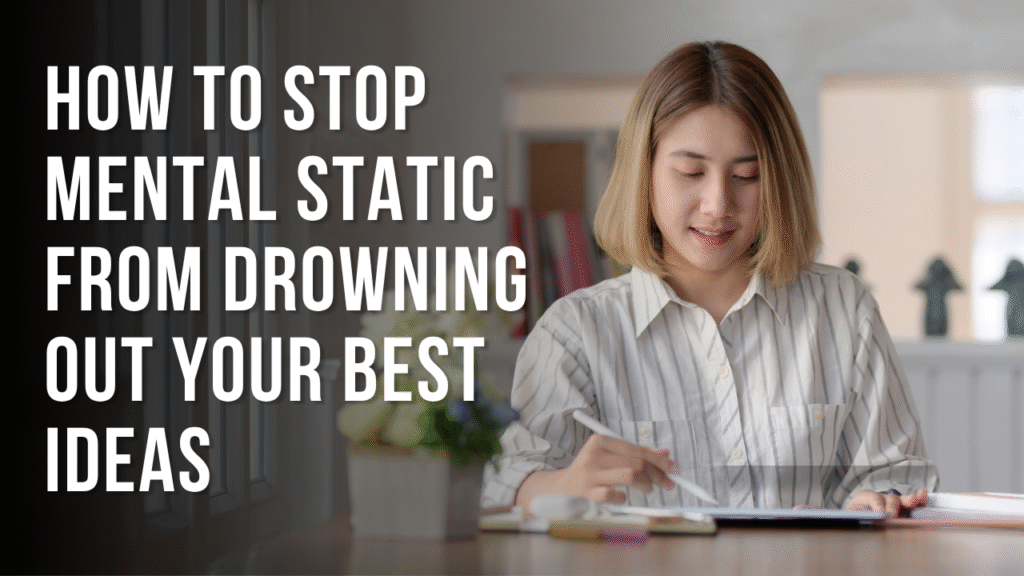You know when you’re about to fall asleep and suddenly you remember that awkward thing you said in a meeting three years ago? Or you’re in the middle of working on something important and your brain decides to replay a song you haven’t heard since high school? That’s mental static. It’s not always loud. Sometimes it’s this low-grade hum in the background, a constant busyness in your head that makes it impossible to hear yourself think.
The tricky part is that mental static doesn’t always feel like a problem. We’ve gotten so used to it, we treat it like the natural soundtrack of being human. Everyone’s juggling a thousand things, right? The problem is, your best ideas — the real breakthroughs, the kind that change how you see things — don’t shout over the noise. They wait for you to be quiet enough to notice them. And most of us don’t get quiet enough, often enough.
If you’ve ever had one of those “shower thoughts” that suddenly solves a problem you’ve been stuck on for weeks, you’ve experienced what happens when the static drops for a few minutes. It’s not magic. It’s just what your brain can do when it’s not busy trying to answer every ping and chase every distraction.
Where’s it Coming From?
The first step to stopping mental static is recognizing where it’s coming from. A lot of it is external — constant notifications, endless scrolling, the news cycle that never sleeps, the background chatter from people who think out loud about everything. But a lot of it is internal too. You carry mental noise from unresolved decisions, unfinished tasks, and overthinking things you can’t control. The outside noise flips the switch, but the inside noise keeps it running.
Some of this static is sneaky. You might think, “I’m not distracted, I’m just thinking ahead.” But there’s a difference between intentional planning and running imaginary scenarios on repeat. One moves you forward. The other drains your mental battery until you’re too tired to think clearly.
If you want to hear your best ideas, you have to start lowering the volume — not just once in a while, but as part of your normal day. That means creating pockets of mental stillness where your brain isn’t busy reacting to something. You don’t need to book a cabin in the woods for a month. You need moments where you’re not consuming, not performing, and not rushing to the next thing.
One way to do this is by deliberately doing something slow. Something your brain doesn’t have to “win” at. Washing dishes without the podcast on. Walking without checking your phone. Folding laundry and letting your mind wander. It’s uncomfortable at first because you’re used to filling every gap with input, but that’s exactly why the static’s so loud — you never let it run out of fuel.
Stop The Loop!
The second way to cut static is by clearing unfinished mental loops. Your brain hates open tabs, whether they’re actual browser tabs or just things you’ve been meaning to deal with. The more of them you leave open, the more background processing power they steal. Write them down somewhere you trust. Decide when you’ll deal with them, or decide they’re not worth keeping. Either way, get them out of your head and into a place where you don’t have to remember them.
Another source of static is the constant mental commentary we run on ourselves. You know the one — the critic that rewrites your emails three times before sending them, the worrier that keeps checking if you made the wrong choice, the replay of conversations where you wish you’d said something better. It’s exhausting. And here’s the thing — most of those thoughts aren’t even accurate. They’re just habits your mind has picked up. If you catch yourself in one of these loops, ask, “Is this actually useful right now?” If not, drop it. You can always come back to it later, but nine times out of ten, you won’t need to.
A big part of hearing your best ideas is protecting your mental space like you would protect anything valuable. That might mean setting boundaries with people who offload every drama onto you. It might mean saying no to a project that would bury you in stress without giving you anything back. It might mean being more intentional about what you consume. Your mind is not a landfill for every piece of information the internet spits out.
Here’s something a lot of people don’t realize — your best ideas usually come in the quiet after you’ve given your brain something to chew on, not while you’re frantically trying to force them out. If you’re working on a problem and you feel stuck, step away. Let your mind shift gears. Go do something unrelated. Your brain will keep working on it in the background, and when the static drops, the answer can appear almost fully formed.
Of course, there’s another reason static drowns out ideas — fear. Sometimes you already know the idea, but it’s buried under all the “what ifs” and “I’m not ready” and “this will never work.” Static can be a defense mechanism. As long as your head is noisy, you never have to face the idea that could change everything, because change — even the good kind — feels risky.
This is why it’s not enough to just get quiet. You also have to be willing to listen to what comes up when you do. Some of it will be exciting. Some of it will be uncomfortable. But if you want the kind of ideas that actually move you forward, you can’t just cherry-pick the easy ones.
Making Space for Clarity in a Noisy Life
You might be wondering how all this fits into everyday life. After all, most people don’t get paid to sit around thinking in a quiet room. The point isn’t to escape your responsibilities. It’s to stop letting the noise be the boss. That can be as simple as:
- Turning off notifications for anything that isn’t essential
- Building a short “no input” time into your day
- Writing down thoughts so they don’t keep bouncing around in your head
- Practicing saying, “I’ll think about that later” instead of instantly reacting
- Giving your brain some low-stakes space to wander
If you do this regularly, you’ll notice something — your mind starts to feel less crowded. And when it’s less crowded, the good ideas have room to show up. You’ll recognize them because they feel lighter than the noise. They don’t come with panic or pressure. They feel obvious in the way truth feels obvious once you finally see it.
The goal here isn’t to eliminate all noise forever. That’s impossible, and honestly, some background buzz is fine. The goal is to keep it from running the whole show. To be able to turn the volume down when you need to hear yourself think.
Because the truth is, your best ideas are already in there. They’re not hiding because you’re not creative enough or smart enough. They’re hiding because you’ve been standing in a crowded room, trying to listen for a whisper. Clear the room, even for a few minutes a day, and you might be surprised at how quickly you start hearing what’s been there all along.



